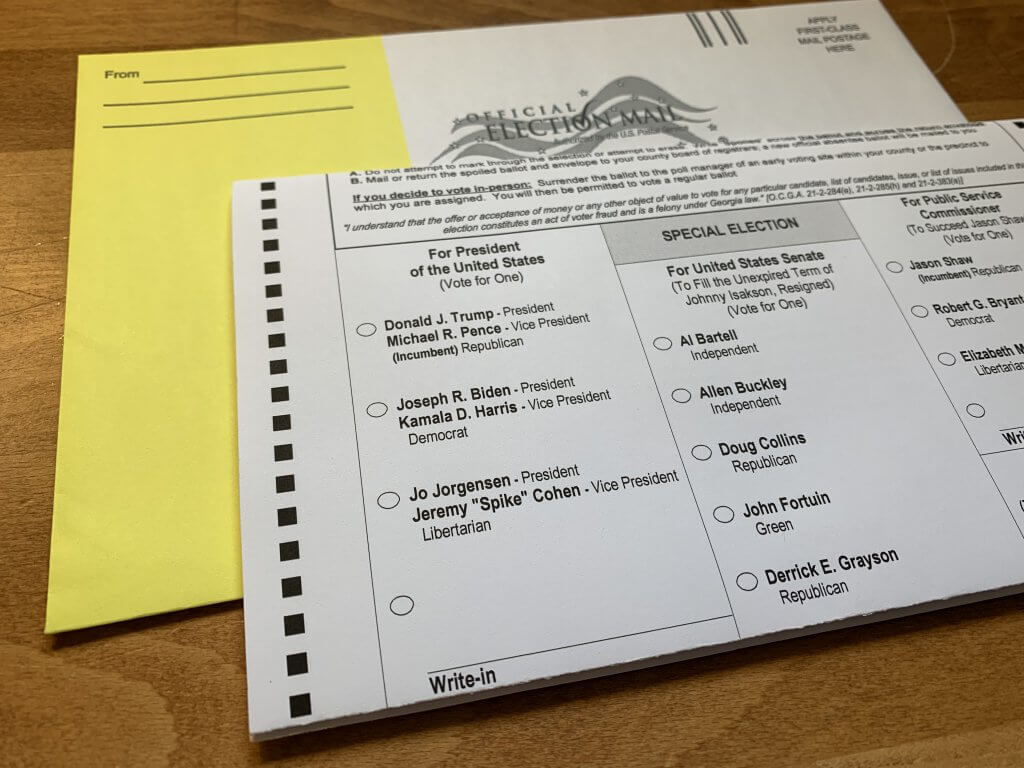
Georgia’s Senate Bill 202 included new provisions that prevented voter registration organizations from distributing pre-filled absentee ballot applications to voters or blank applications to any resident who had already requested an absentee ballot. File Jill Nolin/Georgia Recorder
A federal judge has rejected a challenge to absentee ballot restrictions implemented under a controversial measure passed in 2021, delivering a blow to one of the last ongoing lawsuits against the sweeping election law.
The law, passed as Senate Bill 202, included new provisions that prevented voter registration organizations from distributing pre-filled absentee ballot applications to voters or blank applications to any resident who had already requested an absentee ballot — as happened in 2020. Plaintiffs in the lawsuit argued that the restrictions infringed upon their First Amendment rights.
In a 50-page decision issued late Monday, U.S. District Judge J. P. Boulee upheld the law’s absentee ballot application provisions, ruling that the use of pre-filled absentee ballot applications increased confusion among voters and that the secretary of state’s office had demonstrated “interrelated compelling governmental interests” in curtailing their use.
“The prefilled absentee-ballot applications sparked confusion and concern about voter fraud, especially when the prefilled information was incorrect,” he wrote in his decision. “Voters complained or were confused about duplicate applications as well.”
The Voter Participation Center and the Center for Voter Information, two nonprofit, nonpartisan organizations which sent out approximately 9.6 million absentee ballot request forms in Georgia ahead of the 2020 election and helped bring the lawsuit against the law, condemned the decision. Georgia had 7.6 million registered voters in 2020, according to government data.
“These provisions block important work that has proven time and time again to help the voters of Georgia,” said Tom Lopach, who serves as president and CEO of both organizations. “In the context of increasing government overreach into our elections, the Court’s decision to limit advocacy at the expense of the right to free speech is deeply concerning. We will continue to fight to protect programs that we know help eligible Georgia voters.”
The groups added that they are “reviewing the ruling and assessing our legal options.”

Secretary of State Brad Raffensperger, who has repeatedly defended SB 202 over the course of his two terms, applauded Boulee’s ruling.
“SB 202 is about common sense: Protecting voters from confusion, making sure every vote counts once, and keeping our elections free, fair, and secure,” Raffensperger said in a statement. “The fact that the law keeps winning in court shows that Georgia is leading the way for election integrity.”
Defenders of the 2021 law also celebrated a victory earlier this year, when U.S. Attorney General Pam Bondi dismissed a Biden-era Department of Justice lawsuit alleging that the sweeping election overhaul violates the federal Voting Rights Act aimed at protecting minority voters from disenfranchisement.
But other challenges to the omnibus election law, which also imposed new ID requirements on absentee voters, limited the use of ballot drop boxes, permitted mass voter eligibility challenges and — perhaps most controversially — banned distribution of food and water to voters waiting in line, are still working their way through the courts. In August, the 11th Circuit Court of Appeals heard oral arguments over the food and water provision, which Boulee blocked in 2023. A decision in that case has yet to be released.
The bill was passed during the legislative session following the 2020 election, when President Joe Biden narrowly defeated President Donald Trump in Georgia and Democrats flipped the state’s two U.S. Senate seats. Over 1.3 million Georgians cast absentee ballots in the 2020 election, which was held during the Covid-19 pandemic.
YOU MAKE OUR WORK POSSIBLE.


![[Aggregator] Downloaded image for imported item #1136430](https://whitecounty.com/wp-content/uploads/2025/09/IMG_8761-696x522.jpeg)


